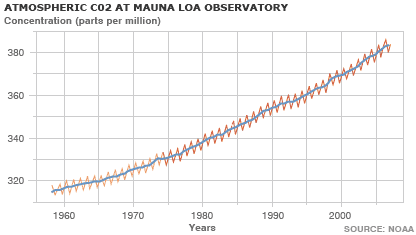Greenhouse gases already beyond 'worst-case': scientist
 (by Meraiah Foley - AP) - Sydney, Australia — Worldwide economic growth has accelerated the level of greenhouse gas emissions to a dangerous threshold scientists had not expected for another decade, according to a leading Australian climate change expert.
(by Meraiah Foley - AP) - Sydney, Australia — Worldwide economic growth has accelerated the level of greenhouse gas emissions to a dangerous threshold scientists had not expected for another decade, according to a leading Australian climate change expert.Tim Flannery told Australian Broadcasting Corp. that a forthcoming report by the UN Intergovernmental Panel on Climate Change will contain new data showing that the level of climate-changing gases in the atmosphere has already reached critical levels.
Mr. Flannery is not a member of the IPCC, but said he based his comments on a thorough review of the technical data included in the panel’s three working group reports published earlier this year.
Carola Traverso Saibante, spokeswoman for IPCC headquarters is in Geneva, said she was unable to disclose what would be in the final report synthesizing the data before it is released in November.
A spokesman for Australia’s IPCC delegate, Ian Carruthers, also said he had to decline comment on the report because it was still in draft form.
However, Mr. Flannery was adamant about the what the report would show.
“What the report establishes is that the amount of greenhouse gas in the atmosphere is already above the threshold that can potentially cause dangerous climate change,” Mr. Flannery told the Australian broadcaster late Monday.
“We are already at great risk of dangerous climate change. That’s what these figures say. It’s not next year or next decade. It’s now.”
Mr. Flannery, whose recent book The Weather Makers: How Man Is Changing the Climate and What It Means for Life on Earth, made bestseller lists worldwide, said the data showed that the amount of carbon dioxide and other greenhouse gas emissions had reached about 455 parts per million by mid-2005, well ahead of scientists’ previous calculations.
“We thought we’d be at that threshold within about a decade, that we had that much time,” Mr. Flannery said. “I mean, that’s beyond the limits of projection, beyond the worst-case scenario as we thought of it in 2001,” when the last major IPCC report was issued.
The new data could add urgency to the next round of UN climate change talks on the Indonesian island of Bali in December, which will aim to start negotiations on a replacement for the 1997 Kyoto Protocol, which expires in 2012.
In Germany, Chancellor Angela Merkel called Tuesday for an international system of global emissions trading to be adopted as part of an agreement to flight climate change from 2012 onward.
Speaking at a symposium of Nobel laureates and other leading scientists, Mr. Merkel insisted that only by establishing limits on carbon dioxide output per individual around the world — suggesting about two tons a head — could the fight to stop global warming be effective.
“Our long-term goal can only be the assimilation of worldwide per capita emissions,” Mr. Merkel told the conference.
Her suggestion would mean drastic cuts: Germany currently has a carbon dioxide output of some 11 tonnes a person a year, while the U.S. is at around 20 tons a person.
Mr. Flannery said that the recent economic boom in China and India has helped to accelerate the levels of carbon dioxide and other greenhouse gases in the atmosphere, but strong growth in the developed world has also exacerbated the problem.
“It’s a worldwide issue. We’ve had growing economies everywhere, we’re still basing that economic activity on fossil fuels,” he said. “The metabolism of that economy is now on a collision course clearly with the metabolism of our planet.”
You can return to the main Market News page, or press the Back button on your browser.

